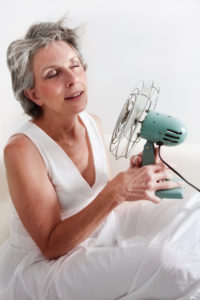Phytoestrogen compounds have been a subject of considerable research over the last several decades, especially those from soybeans, called isoflavones. Studies on soy isoflavones and hot flashes/night sweats vary in dosages, but the average is 54 mg/day. An analysis of 36 publications: soy isoflavones, at an average of 54 mg per day for 6 weeks to 12 months did significantly reduce the frequency of hot flashes by 20.6% when compared with individuals taking placebo. (Taku, K, et al. Extracted or synthesized soybean isoflavones reduce menopausal hot flash frequency and severity: systematic review and meta-analysis of randomized controlled trials. Menopause 2012; 19(7):776-790. ) Individual studies and other reviews put the predicted effectiveness much higher, at 50-65% reduction in hot flashes/night sweats of 50 mg or more soy isoflavones, which is also approximately equivalent to two servings per day of a soy food.
those from soybeans, called isoflavones. Studies on soy isoflavones and hot flashes/night sweats vary in dosages, but the average is 54 mg/day. An analysis of 36 publications: soy isoflavones, at an average of 54 mg per day for 6 weeks to 12 months did significantly reduce the frequency of hot flashes by 20.6% when compared with individuals taking placebo. (Taku, K, et al. Extracted or synthesized soybean isoflavones reduce menopausal hot flash frequency and severity: systematic review and meta-analysis of randomized controlled trials. Menopause 2012; 19(7):776-790. ) Individual studies and other reviews put the predicted effectiveness much higher, at 50-65% reduction in hot flashes/night sweats of 50 mg or more soy isoflavones, which is also approximately equivalent to two servings per day of a soy food.
The current study investigated the effect of soybean and omega-3 fatty acid supplementation on menopause symptoms in postmenopausal women in a randomized, double-blind, placebo-controlled trial. This Iranian study of postmenopausal women included 180 women who were randomly given either soybean powder extract (Soygan 500 mg capsule or omega-3 fatty acids Omega-Rex 1,000 mg soft gel- including 180 mg eicosapentaenoic acid and 120 mg docosahexaenoic acid) , or placebo for 12 weeks. There were 60 women in each group.
The primary outcome was a change on the menopause rating scale (MRS) score which is a health-related quality of life scale to measure the presence and severity of menopause symptoms. It is composed of 11 items that are divided into three subscales: somatic, psychological and urogenital.
Analysis revealed that compared with placebo-group responses, there was a significant difference between the placebo and Soygan and Omega-Rex groups, however there was no difference between the soy and omega-3 supplement. The Soygan and Omega-Rex reduced the MRS score improved menopause symptoms in postmenopausal woman.
Commentary: I have two challenges with this study. There was no statement about the amount of isoflavones in the soy group, only that it was 500 mg of the powder and extract of soybean. If the omega-3 fatty acid product contained 180 mg of EPA and 120 mg of DHA, of the 1,000 mg total of omega-3 fatty acid, this is a distinctly low amount of EPA/DHA. In addition, the current study does not quantify the amount of daidzen and genistein which are the two most abundant isoflavones in soy. More recent research on soy isoflavones in menopausal women suggests that women who produce the daidzen metabolite equol may have better responses with soy supplementation. The prevalence of equol producers in Iranian women, let alone the women in this study was not reported.
Overall, the data of soy isoflavone supplements for use in managing menopause symptoms has shown mixed results with some studies being of lower quality.
Three prior studies on using omega-3 in hot flashes/night sweats in menopausal women combined EPA/DHA of more than 1,200 mg per day. The current study is only 300 mg combined EPA/DHA. In these three randomized controlled trials involving 483 women meta-analysis of the data showed no difference in the frequency and severity of hot flushes, insomnia severity, sleep quality, quality of life and adverse effects between the two groups. Compared to placebo group, women who received omega-3 supplements experienced lower frequency of night sweats (not daytime hot flashes). (Mohammady M, et al. Effect of omega-3 supplements on vasomotor symptoms in menopausal women: a systematic review and meta-analysis. Dur J Obstet Gynecol Reprod Biol. 2018;228:295-302.)
In the end, it is my clinical approach to expect only modest symptom relief for soy isoflavones or omega-3 fatty acids for hot flashes and/or night sweats. There are other natural therapies that I am more optimistic about for these particular symptoms, although with breast cancer patients/breast cancer survivors, the soy isoflavones and omega-3 fatty acids are on the list for hot flashes and/or night sweats due to the other significant potential benefits of soy and omega-3 fatty acids in breast cancer patients while at the same time safe.
Reference: Purzand B, Rokhgireh S, Zanjani, M, et al. The comparison of the effect of soybean and fish oil on supplementation on menopausal symptoms in postmenopausal women: a randomized, double-blind, placebo-controlled trial. Complement Ther Clin Pract 2020;41:101239)

